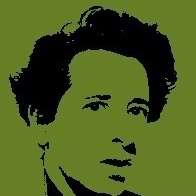Hannah Arendt: vida y mundo de Rosa Luxemburgo y Sócrates
Contenido principal del artículo
Resumen
El artículo se acerca a la pensadora Hannah Arendt a través de dos figuras presentes en su vida y en su obra: Rosa Luxemburgo y Sócrates. La infancia y adolescencia de Arendt transcurren en un ambiente de implicación política cuyo eje central era la admiración por la figura de Rosa Luxemburgo. Martha Arendt, madre de Hannah, fue la primera fuente de transmisión de los ideales de Rosa Luxemburgo a su hija, y dentro de estos ideales la libertad ocupaba un lugar central. Sócrates, por su parte, constituye para la autora el paradigma de la persona que piensa, que dialoga tanto consigo mismo como con los otros.
Descargas
Detalles del artículo

Esta obra está bajo una licencia internacional Creative Commons Atribución-NoComercial-SinDerivadas 4.0.
Los autores mantienen la Propiedad de los Derechos de Autor y Derechos de Reproducción.
Los autores/as pueden realizar otros acuerdos contractuales independientes y adicionales para la distribución no exclusiva de la versión del artículo publicado en esta revista (p. ej., incluirlo en un repositorio institucional o publicarlo en un libro) siempre que indiquen claramente que el trabajo se publicó por primera vez en esta revista.
Se permite y recomienda a los autores/as a publicar su trabajo en Internet (por ejemplo en páginas institucionales o personales) posterior al proceso de revisión y publicación, ya que puede conducir a intercambios productivos y a una mayor y más rápida difusión del trabajo publicado.
Citas
Amaris Duarte, O. Una poética del exilio. Hannah Arendt y María Zambrano. Barcelona: Herder, 2021.
Arendt, H. Hombres en tiempos de oscuridad. Tr. C. Ferrari y A. Serrano de Haro. Barcelona: Gedisa, 1990.
Arendt, H. La condición humana. Tr. R. Gil Novales. Barcelona: Seix Barral, 1974.
Arendt, H. La vida del espíritu. Tr. C. del Corral y F. Birulés. Barcelona: Paidós, 2002.
Arendt, H. Los orígenes del totalitarismo. Tr. G. Solana. Madrid: Taurus, 2001.
Arendt, H. Responsabilidad y juicio. Tr. M. Candel y F. Birulés. Barcelona: Paidós, 2007.
Birulés, F. (Comp.). El orgullo de pensar. La obra filosófica de Hannah Arendt. Barcelona: Gedisa, 2000.
Bättler, S.; Marti, I. M. “Rosa Luxemburg and Hannah Arendt: Against the Destruction of Political Spheres of Freedom”. Tr. S. Saner. En Hypatia 20 (2), 2005, pp. 88-101.
Frönlich, P. Rosa Luxemburgo. Vida y Obra. Tr. F. Montes de Santiago. Madrid: Fundamentos, 1976.
González Suárez, A. La conceptualización de lo femenino en la filosofía de Platón. Madrid: Clásicas, 1999.
Hermsen, J. J. Un cambio de rumbo. Rosa Luxemburgo y Hannah Arendt. Tr. G. Fernández Gómez. Madrid, Siruela, 2021.
Jaume, A. (Ed). Hannah Arendt. La pluralidad del mundo. Antología. Madrid: Penguin-Random House, 2019.
Moreno Sanz, J. Edith Stein en compañía. Vidas filosóficas entrecruzadas de María Zambrano, Hannah Arendt y Simone Weil. Murcia: Plaza y Valdés, 2014.
Muiña, A. Rosa Luxemburg en la tormenta. Madrid: La Linterna Sorda, 2019.
Palomo Cermeño, E. Rosa Luxemburgo (1871-1919). Madrid: Ediciones del Orto, 2003.
Platón. “Apología”. En Diálogos I. Tr. J. Calonge. Diálogos I, Madrid, Gredos, 1982.
Platón. “Critón”. En Diálogos I. Tr. J. Calonge. Diálogos I, Madrid, Gredos, 1982.
Platón. “Fedón”. En Diálogos III. Tr. C. García Gual. Madrid: Gredos, 1986.
Platón. “Hipias Mayor”. En Diálogos I. Tr. J. Calonge. Diálogos I, Madrid, Gredos, 1982.
Posada Kubissa, L. “El feminismo (o la ausencia del mismo) en el pensamiento político de Hannah Arendt”. En Revista internacional de pensamiento político 13, 2018, pp. 383-397.
Prinz, A. La filosofía como profesión o el amor al mundo. Tr. M. B. Ibarra de Diego. Barcelona: Herder, 2001.
Sánchez Muñoz, C. “La ciudadanía de las mujeres: las hijas espúreas de Hannah Arendt”. En Valcárcel, A. y Romero, R. Pensadoras del siglo XX. Sevilla: Instituto Andaluz de la Mujer, 2001, pp. 45-59.
Young Bruehl, E. Hannah Arendt. Una biografía. Tr. M. Lloris Valdés. Barcelona: Paidós, 2006.

